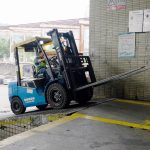There is no alternative to globalisation for the economy – despite crises and the resulting disruptions to supply chains. This was the tenor of a business conference held at the Jahrhunderthaus in Bochum on May 18. The SCM software provider Setlog, and the Ruhr regional group of the Bundesvereinigung Logistik (BVL) e. V. invited representatives from business, science, and politics in cooperation with the Kompetenznetz Logistik.NRW and the Verband Verkehrswirtschaft und Logistik NRW (VVWL).
The experts agreed that companies must learn their lessons from the Covid-19 pandemic and the Ukraine crisis. “Companies should take a close look at their sourcing markets and, if necessary, adjust supplier networks and transport routes,” said Ralf Duester (pictured), a member of Setlog’s board of directors. In his opinion, India, as well as other Asian countries, but also Central and South America, could come into focus more than before for supply chain managers and buyers.
“Whatever the decision, the important thing is that companies need to build resilient supply chains,” says SCM expert Duester. To do this, companies must bring transparency to their supply chains, rely on digital solutions, and take advantage of opportunities to work more closely with their suppliers and logistics partners than before, he said.
Prof. Dr. Andreas Pinkwart (FDP), Minister for Economic Affairs, Innovation, Digitalisation and Energy of the German state of North Rhine-Westphalia, emphasised: “Open global trade and unobstructed access to international markets offer numerous opportunities that we must recognise and seize. Only when doing this can we take full advantage of digitisation.”
In addition, the minister said, “For North Rhine-Westphalia in particular, with its outstanding international competitive position, the interplay of foreign trade, digitisation and innovation strategies is of particular importance. This involves adapting to new developments, opening new markets and exploiting the potential for the performance and future viability of the economy even better through international innovation partnerships. A modern energy policy also plays a special role.”
Prof. Dr. Dr. h.c. Michael ten Hompel explained why separating Germany from other countries would also be the wrong move from a scientific point of view. According to the Managing Director of the Fraunhofer IML in Dortmund, this decision would, among other things, lead to sustainability goals not being achieved. According to the researcher, companies must move away from looking for simple solutions to “increasingly complex challenges.” Without the use of digital tools, he says, successful business is no longer possible. In addition to many IT solutions from abroad, also powerful software “Made in Germany” is available. The economy also needs to get used to the fact that many tools are used simultaneously within a company – from AI-based platforms to blockchain and cognitive computing.
The scientist also emphasised the need for more collaboration in the economy. His example: the joint use of open source offerings in logistics. In this regard, he highlighted the initial successes of the Open Logistics Foundation. “The first components are ready,” ten Hompel reported. As examples, he cited solutions for the VDA 5050 communication interface and the “intelligent garbage can” that reports back when it is full. The latter is a project of logistics service provider Rhenus, which is now making components available to other companies.
According to IT expert Ann-Christine Lehmann of Lufthansa Industry Solutions, the use of modern IT tools is also essential if companies plan to address the requirements of the German Due Diligence Law, which will apply to companies with more than 3,000 employees from 2023 on. She emphasised that SMEs should also deal with the topic promptly, because trade and industry groups are currently drawing up new contracts and the EU is at the same time working on a law that will already apply to companies with 250 or more employees in resource-intensive industries, such as textiles. She pointed out that pioneers in implementing the regulations can successfully differentiate themselves from the competition. This is also the opinion of Niklas Koellner, Managing Director at household goods supplier Wenko. The family-owned company was already working on the topic with its 200 suppliers and developed its own code for its major customers so that it would not have to “reinvent the wheel” for every request.
Whether pandemic, flood, or military conflict: Christine Mezger-Behan, Vice President Logistics System at intralogistics provider KION Group, assumes that economic and political uncertainties will continue to accompany us in the future. That is why the Group is developing solutions to deal with different situations. In addition to creating transparency in the supply chain, the strategies include driving innovations for global supply chains, using special indicators and active planning in various scenarios. Turning the global economic world upside down because of the current crises is not an option for Mezger-Behan: “Globalisation is set.”
The global flow of goods is also without alternative for fashion supplier Gerry Weber International. To prepare for the future, the company has taken several measures, according to Gökay Bostanci, authorised signatory of the Halle/Westphalia-based company. One is to use Setlog’s software OSCA to achieve transparency in the supply chain, to dispatch shipments for third countries directly from suppliers (direct shipments) and to transfer manual processes from the warehouses to the stores. On the other hand, high-margin fashion products are usually delivered to the warehouse first to prevent a backlog of goods. To shorten delivery times, more items than before are now also delivered to the stores flat packed rather than as hanging garments. Gerry Weber International equipped the stores with special equipment for this purpose, so that the products can be processed and finished there accordingly.
The post “There is no alternative to globalisation” appeared first on Logistics Business® Magazine.


